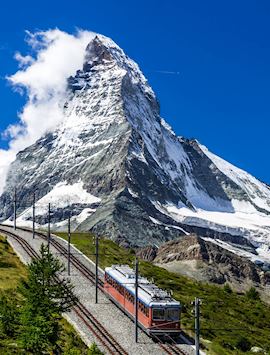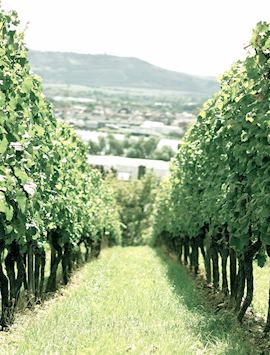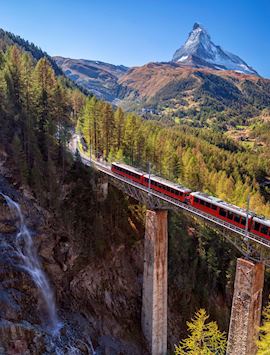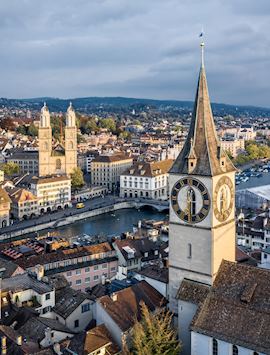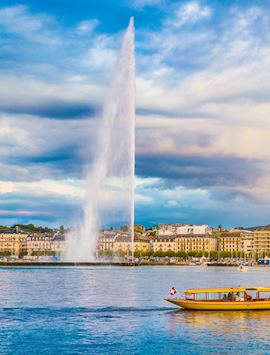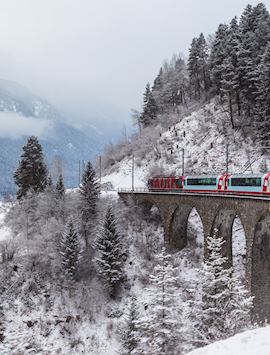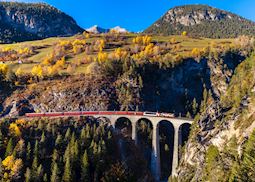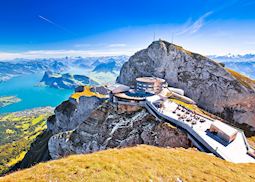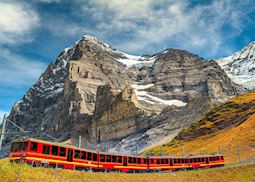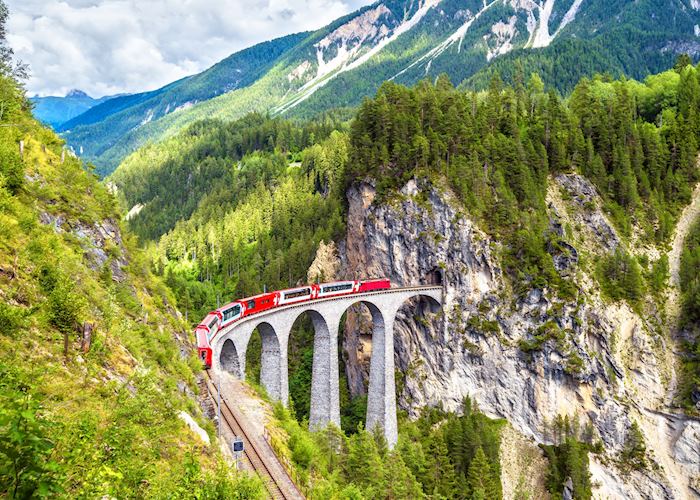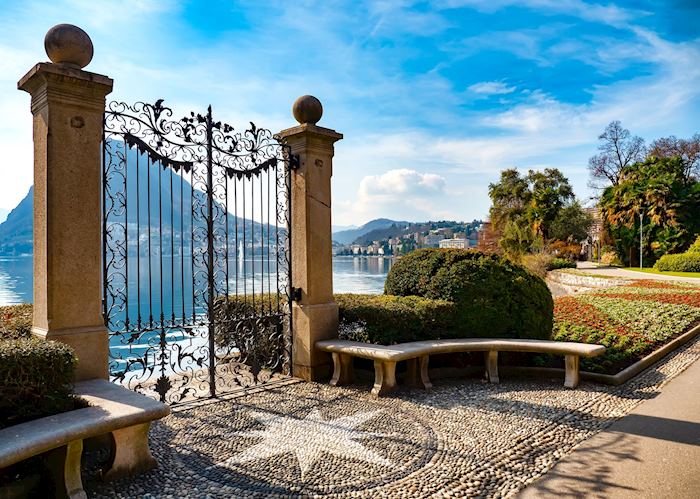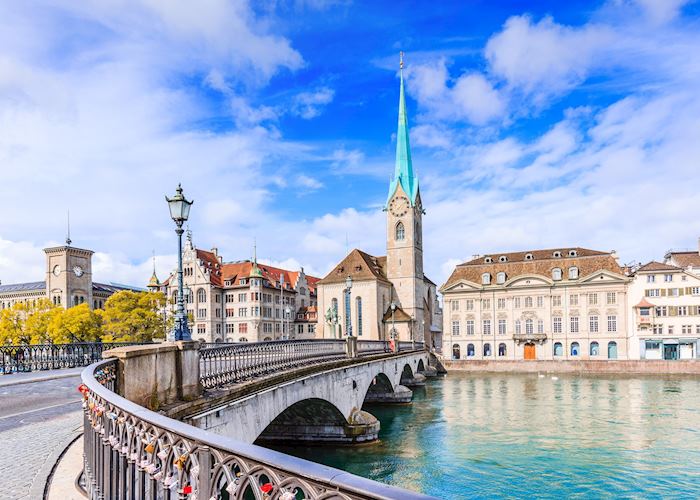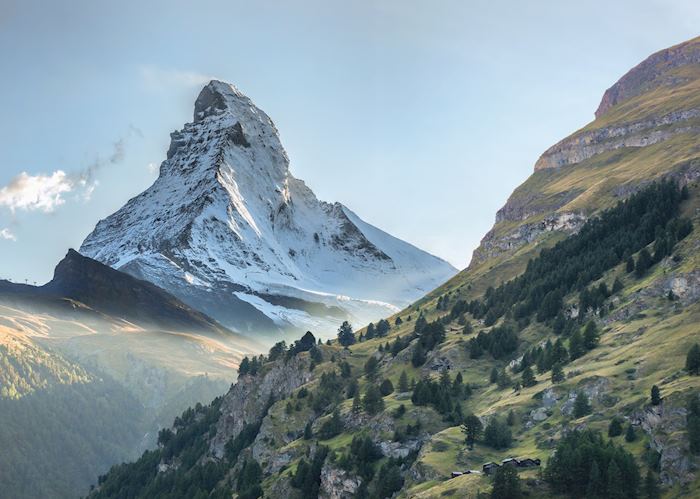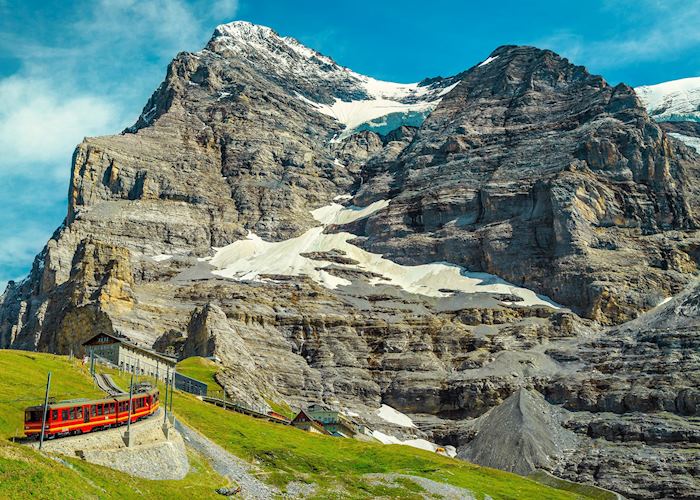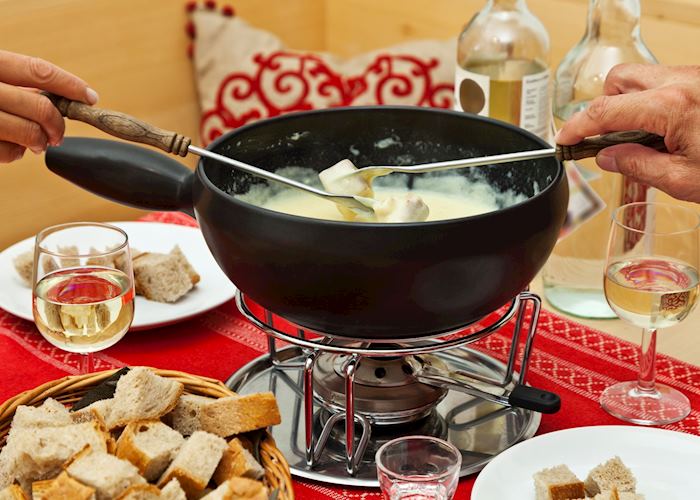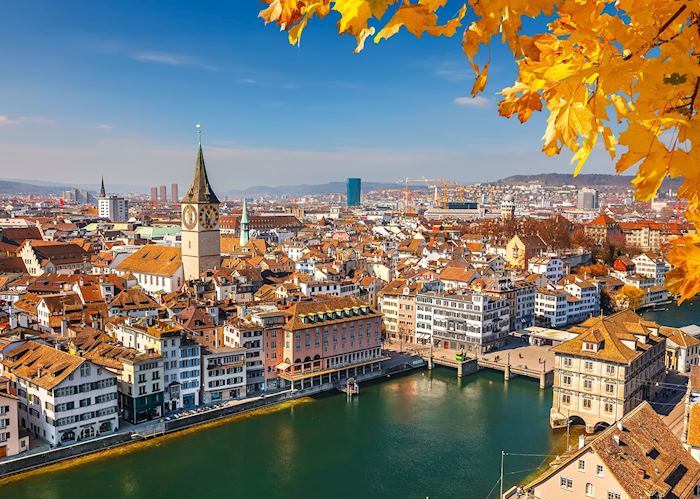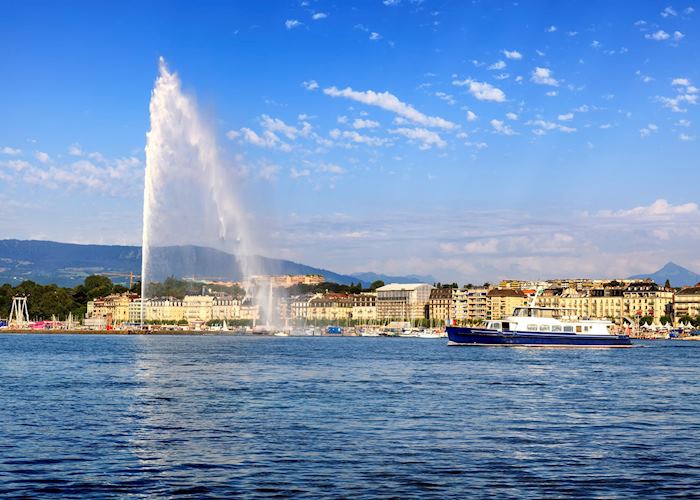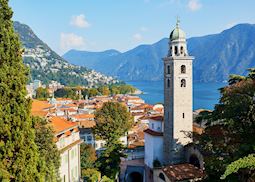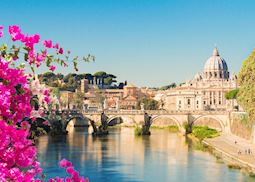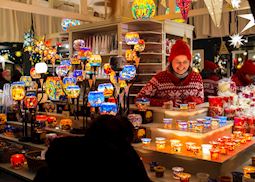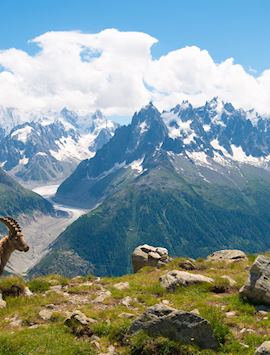
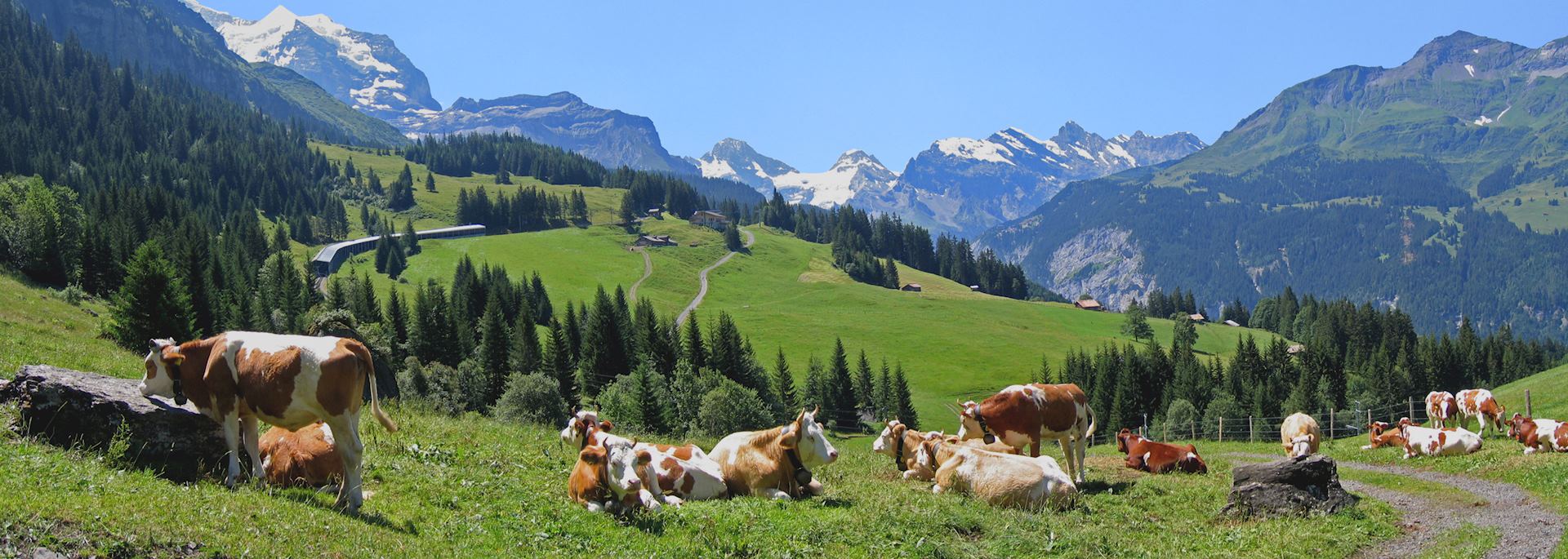
Tailor-made Switzerland vacations shaped around your passions
With its pristine Alpine mountainscapes, bucolic dairy villages and glittering international cities, Switzerland combines broad cultural influences with a deeply independent attitude. Surrounded by other European countries yet protected by its forbidding mountain range, Switzerland is a nation of many regions, languages and landscapes. Our specialists have visited the whole country, from French-speaking Geneva in the west, where the UN has its headquarters, to the glitzy mountain retreat St. Moritz in the east, where Swiss-German is the main language.
We can help you visit a wine region during a jazz festival in Montreux, walk through an intact medieval town in Swiss-German Bern, see the world’s longest glacier from a mountain summit in the Swiss Alps and learn to make risotto in a lakeside grotto in Italian-speaking Ticino. Whether you want to shop Zürich’s fashionable streets, hear alphorn players in the Emmental Valley or see the Matterhorn mirrored in a glassy lake, we’ll tailor your vacation in Switzerland to your interests.
Suggested tours for Switzerland
These tours give you a starting point for what your vacation to Switzerland could entail. Treat them as inspiration, as each trip is created uniquely for you.
Suggested activities for Switzerland
Whatever your interests, our specialists will build activities into your trip that connect to how you want to experience Switzerland.
-
Glacier Express train journey ![The train passes over the Landwasser viaduct]()
Glacier Express train journey
St. MoritzGlacier Express train journey
The Glacier Express panoramic train meanders through the pine-covered valleys and barren mountain passes of the Swiss Alps between St. Moritz and Zermatt, and you can see it all while enjoying exceptional service on this day-long railway journey.
View details -
Day trip to Pilatus Kulm ![Mt Pilatus excursion, Lucerne]()
Day trip to Pilatus Kulm
LucerneDay trip to Pilatus Kulm
Take a boat ride, a steep tramway, a mountaintop walk and a gondola in this day-long trip to Mount Pilatus, which soars to several peaks above Lake Lucerne. You can revel in 360-degree views from the top of the tallest peak, Tomlishorn.
View details -
Jungfraujoch — Top of Europe ![Jungfraujoch — The 'Top of Europe']()
Jungfraujoch — Top of Europe
InterlakenJungfraujoch — Top of Europe
The highest train station in Europe, the Jungfraujoch gives you sweeping views of the Jungfrau, the Mönch and the Eiger, the storied peaks of the Bernese Alps. Walk the decks of the Sphinx Observatory and see the continent’s longest glacier, the Aletsch, on this day-long tour.
View details
Why travel with Audley?
- 100% tailor-made tours
- Fully protected travel
- Established for over 25 years
- 98% of our clients would recommend us
Best time to visit
Our specialists advise on the best months to visit Switzerland, including information about climate, events and festivals.
Request our brochure
Covering all seven continents, The World Your Way shows you how you can see the world with us. It features trip ideas from our specialists alongside hand-picked stays and experiences, and introduces our approach to creating meaningful travel experiences.
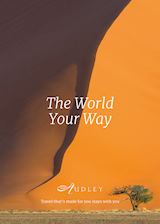
Useful information for planning your vacation in Switzerland
Switzerland has four national languages: Swiss-German, French, Italian, and Romansh. The most widely spoken is Swiss-German, but you’ll hear French in the western regions, Italian in the south and, in the southeast, a tiny percentage of the population still speaks Romansh. However, English is widely spoken, making travel and conversation simple.
Swiss Francs (CHF) are Switzerland’s national currency, but many places accept euros as well. Credit and debit cards are widely accepted, but in some small, remote towns, you may still be asked to pay cash.
Tips in Switzerland’s restaurants are generally included in the final cost, but it’s common to round up the total. The same holds true for taxis, but tips for housekeeping are not common.
For the latest travel advice for Switzerland, including entry requirements, health information, and the safety and security situation, please refer to the Canadian Government Travel & Tourism website.
Cheese features heavily on the national menu and one classic dish you should try in Switzerland is fondue, a rich, creamy pot of warmed Gruyère, Emmental, and white wine, which serves as a dipping sauce for crusty bread. Other local dishes include raclette, which is made from cheese of the same name melted and served with potatoes, and rösti, pan-fried grated potatoes which often accompany eggs, cheese, meat, or vegetables.
Swiss chocolate is well-known around the world, and you’ll find tempting chocolate shops in almost every town. We’d also suggest trying some of Switzerland’s spirits — often enjoyed as a digestif — such as the once-banned absinthe, kirsch, a cherry brandy, or Goldschläger, a cinnamon schnapps.
With snow-capped peaks, glittering lakes, and historic towns and cities, Switzerland offers a wide range of experiences for the visitor. The weathered mountains and steep valleys cradle deep-blue lakes every bit as beautiful as photographs suggest and with a web of walking trails and an extensive rail network, it’s easy to access the great outdoors.
You can see the sun set over the Matterhorn and spend time in the most indulgent mountain resorts on a tour of the lakes and mountains of Switzerland. Ride the steepest cog wheel train in the world at Pilatus Kulm, visit cheesemakers and chocolatiers, or wander along cobbled streets flanked by half-timbered buildings in Zürich and Bern on a Highlights of Switzerland trip. From cosmopolitan cities offering art galleries, fine dining restaurants and varied nightlife to traditional mountain villages and bustling ski resorts, Switzerland promises majestic landscapes, outdoor adventures, and urban sophistication.
Switzerland offers a wide variety of places to go depending on what you’d most like to see. Cosmopolitan Geneva with its medieval old town, stately architecture, and striking Jet d’Eau — a fountain shooting water high into the crisp mountain air — is a good place to start.
You could then head to a traditional Swiss resort town such as Montreux on the edge of Lake Geneva to relax, plan to go hiking, or climbing in the Bernese Oberland, or see the Matterhorn from Zermatt.
Set between soaring peaks, Lugano is a beautiful historic town on the shore of a glacial lake, waterfront Lausanne has a 12th-century cathedral and a Florentine-Renaissance-style museum, while compact Lucerne is best known for its handsome medieval streets.
From chic mountain resorts to intimate villas and slick boutique hotels, you can pick and choose where to stay in Switzerland from a wide variety of options. For old-world charm, art and antique-filled rooms, and a Michelin-starred restaurant, the Villa Castagnola on the shores of Lake Lugano is an excellent choice.
In Zürich, stay in the heart of the old town at the Marktgasse Hotel which blends crisp, modern design with historic features. Experience traditional Swiss style and hospitality at the Hotel Daniela in Zermatt, or stay at the century-old Hotel Belvedere in Grindelwald at the foot of the Eiger.
Expect to spend around eight hours in the air if you’re flying to Zürich from Toronto. There are no direct flights from Vancouver, so the journey will take around 12 to 14 hours with a stop en route.
Switzerland uses Central European Time which is UTC+1 hour (EST-6 hours). Daylight Savings Time is observed from late-March to late-October.
The Swiss rail network is extensive and highly efficient and makes a great way to get around the country. Trains will take you right up into the mountains and offer access to remote areas where driving conditions can be challenging.
If you choose to drive, the roads are well maintained but often involve lots of hairpin bends with limited visibility and the concentration needed to drive means you can’t enjoy the scenery quite so much.
No, there are no specific vaccine requirements for visiting Switzerland, however, it’s a good idea to check you’re up to date on all vaccinations that are recommended at home. For further information on suggested travel vaccinations, see the Government of Canada - travel vaccinations website.
As long as you’re visiting for less than 90 days, Canadian citizens do not need a visa to visit Switzerland. Switzerland is part of the Schengen Area and so the number of days spent here will contribute to the 90 days you are allowed in this visa-free zone in any 180-day period.
To travel to Switzerland your passport will need to be valid for at least six months after you leave the country. You’ll also need to have one blank page available for border control documentation.
Switzerland in pictures
Our expert guides to traveling in Switzerland
Written by our specialists from the viewpoint of their own travels, these guides will help you decide on the shape of your own trip to Switzerland. Aiming to inspire and inform, we share our recommendations for how to appreciate Switzerland at its best.
-
Highlights of Switzerland ![Lugano]()
Highlights of Switzerland
Highlights of Switzerland
Switzerland is a small country, but you’ll find much to see and do within its compact borders. Our guide offers a sampling of the country’s charms, from glacier hikes in the Alps to a privately guided tour of Switzerland’s small, storied wine region.
Read this guide -
Top 13 trips to Europe ![View over the Tiber River, Rome]()
Top 13 trips to Europe
Top 13 trips to Europe
From the wintry wilds of Iceland’s shores to the sun-drenched islands of Greece, Europe’s vast diversity means it can be hard to decide where to visit on the continent. Here, we’ve ranked our top tours of Europe to help you make up your mind.
Read this guide -
Top 10 Christmas markets across Europe ![Hamburg Christmas Market]()
Top 10 Christmas markets across Europe
Top 10 Christmas markets across Europe
Each winter, Europe’s towns and cities sprout Christmas markets, sparkling with spangled trees, twinkling lights, spiced wine, and wooden pavilions selling treats and trinkets. We asked our specialists which ones they like best, from Croatia to Oslo to Edinburgh.
Read this guide
